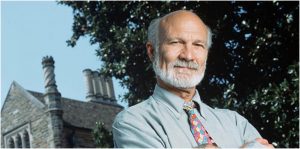Stanley Hauerwas is currently the Gilbert T. Rowe Professor of Theological Ethics at Duke Divinity School, where he has been on faculty since 1984. Additionally, he holds a joint appointment in Duke Law School. Previously, he taught at the University of Notre Dame. Hauerwas was named America’s Best Theologian by Time magazine in 2001. He has been a prolific author and speaker throughout his career. Publishers Weekly named his memoir, Hannah’s Child: A Theologian’s Memoir, one of the Best Religion Titles of 2010.
Book Basics
Working with Words is a collection of essays, sermons and speeches designed to be an “explicit reflection and exhibition of what it means for theology to be work and, in particular, work with words” (p. x). Hauerwas divides the collection into three parts: (1) “Learning Christian: To See and to Speak,” (2) “The Language of Love: From Death to Life,” and (3) “Habits of Speech Exemplified: Some Teachers.” With the exception of one essay, all of the material in the first two parts was written solely by Hauerwas, whereas the majority of material in the final part is co-authored. The selection of so many pieces originally written or spoken in the last few years is a testament to the prolific nature of his work with words.
The book brings together spoken words (including sermons delivered in multiple churches and chapels, a commencement address at a seminary, and a lecture to teens at a summer youth academy) with written words (articles and essays written alone and with a co-author for diverse audiences). It also brings together material that is highly academic in nature with that which is easily accessible to readers who lack an in-depth theological education.
Working with Words: Learning to Speak Christian is an invitation to think theologically not for the sake of attaining knowledge or refining understanding, but to deepen the reader’s Christian vocabulary and embolden her/his discipleship. Read slowly, ponder prayerfully, and embrace wholeheartedly.
So What?
Chapter 6, “Speaking Christian” is Hauerwas’ commencement address at Eastern Mennonite Seminary, which he delivered in May of 2010. In it, he shares these words:
For what you have learned to do in seminary is read. By learning to read you have learned to speak Christian. That you have learned to read and speak means you have been formed in a manner to avoid the pitfalls I have associated with the contemporary ministry. For I want to suggest to you that one of the essential tasks of those called to the ministry in our day is to be a teacher. In particular, you are called to be a teacher of language (p. 86).
I am sure you have read many good books in seminary, but that reading is meant to prepare you to spend a life reading. You must continue to read and study even though you may receive little reward for doing so. You must, moreover, help the people you serve recognize their support of your study is a good the whole people of God have in common (p.93).
As one who graduated from seminary and has spent most of my adult life in parish ministry, I find these words to be at once both incredibly challenging and reassuring.
- For those who serve in ministry positions:
- How do you understand your calling to be a teacher in general and a teacher of language specifically?
- What do you do to ensure that you devote adequate attention to reading and studying? How do you educate your parishioners about the value of the time you spend doing so?
- For those who are a part of local congregations:
- How important is it to you that your pastor/minister/priest is a teacher?
- Does your congregation support your clergy’s effort to read and study by allocating time in their weekly schedules, several weeks of study leave each year, and a sabbatical after an agreed upon number of years?
Stanley Hauerwas. Working with Words: Learning to Speak Christian (Cascade Books, 2011). ISBN: 9781608999682
